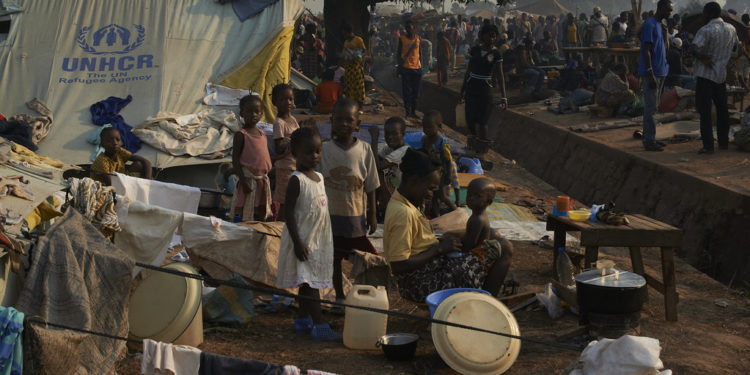By Millicent Zighe
Realising a conflict-free continent is the dream of every
African. Ahead of the 33rd AU Summit we highlight the current hotspots; the
root causes of conflicts; the various efforts in search of peaceful
co-existence and development in line with this year’s theme of
#silencingtheguns.
Barely days after the return of former President
Michel Djotodia, fresh skirmishes erupted in the city of Alindao, Basse Kotto
Prefecture in Central Africa Republic forcing at least 400 to seek shelters at
a United Nations base.
In the midst of the clashes were the armed forces and Muslim Seleka rebel group who have been at loggerheads with the Christian anti Balaka militia group since 2013. Prior to the Alindao attack, a total of 650 people were reported displaced and some injured after houses were burned at the Elim displacement site. According to the UN Stabilization Mission in CAR (MINUSCA) a team involving police, human rights activists and prison will be sent to the area to investigate the attack.
Alindao clashes are the latest in the landlocked nation however the country’s bloodiest day began in 2013 when the Muslim Seleka rebel group seized power in the capital Bangui ultimately overthrowing the then Christian President Francois Bozize, currently in exile at the DRC Congo. The Anti-Balaka militia group made of mainly Christians retaliated in a number of attacks killing over 1000 Muslims in an attempted coup against President Michel Djotodia and the leader of Seleka group. Seleka group started committing counter attacks plunging the country into a humanitarian crisis. During President Djotodia time in the office, conflicts intensified resulting to his resignation in 2014. Despite numerous attempts at reconciliation, current President Faustin Archange Touadera has failed to ease tension between the warring groups since his election in 2016.
The violence has claimed lives of thousands and displaced
over 4.5 million people. Reports have surfaced of human rights abuses
castigated by the armed groups aiming to control the gold, diamond and oil
resources. Abuses listed by Human Rights Watch and UN include killings,
arbitrary arrests, torture, rape against women and girls, use of children as
solders and vandalization of property. People seeking refuge in camps are said
to be living in harsh conditions as many are forced to sleep in the open making
them susceptible to diseases like Malaria. Those in public buildings such
as mosques, churches and airports are also facing similar fate. According to
the UN, Cameroon is hosting the largest population of shelter seekers from the
CAR, approximately 292,787 as of December 2019. Influx of refugees in
country has caused tension with the local community.
In an attempt to end the conflict, 14 armed rebels signed a
treaty in Bangui on February 6, 2019. This was at least the sixth attempt in
restoring peace in one of the world’s poorest nation. The deal which was
brokered by African Union (AU) touched on the causes, commitment to end the
conflict and disarmament however rebels have openly violated treaty. Human
rights defenders have pinned the blame on Sidiki Abbas, the leader of Return,
Reclamation, and Rehabilitation group (3r) and former adviser to the Prime
Minister of CAR Firmin Ngrebada. In September 2019, he facilitated the attacks
on Fulani cattle raiders killing at least 20 people. Sidiki was not held
accountable for the crimes he committed. Many are angered that the warlords,
instead of being charged were offered top ministerial positions. During an
interview with the New Humanitarian, Rockson Mayounga a member of the
opposition coalition EZingo Biani, blasted the government for appointing
warlords in the government saying the peace deal brought nothing as power is
still in the hands of armed groups.
The situation in the country has attracted the attention of
International Criminal Court (ICC). After successfully completing preliminary
investigations, Patrice-Edouard Ngaissona and Alfred ‘Rombhot’ Yekatom were
transferred to the court for their involvement in war crimes and crimes against
humanity including murder, persecution and use of child soldiers. On December
11 2019, ICC confirmed chargers against the two former senior leaders of Anti
Balaka militia.
The establishment of a Special Criminal Court to look into grave crimes committed since 2005 created hope for the impoverished nation nonetheless no charges have been laid against any suspected perpetrators of the civil war. Bangui Criminal Court however sentenced former Anti Balaka warlord Rodrique Ngaibona to life imprisonment after he was found guilty of crimes including murder, armed robbery, false imprisonment and illegal possession of firearms and munitions. According to a report published by Human Rights Watch, women and children were raped on several occasions by men under Ngaibona’s command. The court also convicted Idriss Ahmned el Bachar, a member of Central African Patriotic Movement, a Seleka sub-group for associating with criminals and illegal possession of weapon and munition.







